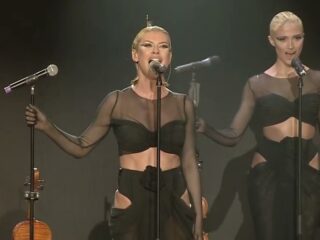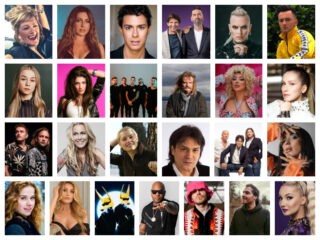
The Armenian sang about an apricot, the Albanian praised Jesus Christ, and the Ukrainian railed against nuclear Holocaust. But in the end, victory at the 55th annual Eurovision Song Contest went to Lena Meyer-Landrut, a 19-year old German whose song blurred the line between puppy love and psychotic obsession. “This is so absolutely awesome. I feel that this is not real,” she said on stage after being handed a crystal microphone-shaped trophy in Oslo’s Telenor Arena. “I’m kind of freaking out.”
Given the popularity of Eurovision, it’s easy to understand why. Drawing more than 120 million viewers each year, the singing competition remains the world’s most-watched non-sporting event. It boasts a cult following in many parts of Europe and is broadcast as far afield as Burma and New Zealand. It has the power to turn nobodies into musical icons; Abba and Celine Dion are past winners, while other alumni include Julio Iglesias, Olivia Newton-John and Cliff Richard.
One thing these famous names have in common: they all competed decades ago. Critics of Eurovision say the event has disintegrated into a cultural Chernobyl, with gimmicks and sex appeal trumping musical ability. There’s some truth to that. This year’s entry from Romania mixed pop and opera, and at times the female lead sounded like Mariah Carey on helium. It placed third. The seventh-place finisher from Armenia sang about the country’s national fruit while dancing around an oversize, 100-lb. replica of an apricot stone; the camerawork emphasized her cleavage. And the French entry, which placed 12th, involved choreographed thrusts to occasionally saucy lyrics: “Darling, you must get up and move your butt … Lala, it will heat up, I feel the stuff up.”
Eurovision has moved away from its roots as a traditional talent show in other ways too. A major Internet presence is essential: without a big-budget music video on YouTube and constant interaction with fans on social-networking sites like Twitter and Facebook, candidates risk being forgotten before the competition even starts. This year, Azerbaijani contestant Safura Alizade, the 17-year-old winner of the local version of American Idol, placed ads all over the Internet saying a victory could “change her destiny.” She also worked with JaQuel Knight, Beyoncé’s choreographer, and Rupert Wainwright, the director of Stigmata, to produce a glossy video for her entry, “Drip Drop.” She and other contestants spent the months leading up to Eurovision touring in a bid to curry favor with the electorate. Eva Rivas, the Armenian contestant, traveled to Greece and Cyprus to plant apricot trees. As she told a Eurovision fan site, “I want to go back to my motherland and to be sure that everybody is under the impression of my performance.”
And while the veneer of sequins, hip-shaking and camp tomfoolery often draws audiences in, it’s a good story that keeps them there. During the second semifinal, on May 27, the members of Lithuanian funk band InCulto blew on kazoos and ripped off their pants to reveal sparkly underwear. But their silly act masked a serious message. Their song “Eastern European Funk” called for greater integration of the European Union, of which Lithuania is a part, and mocked the belief that Europe’s border ends just east of the German border: “Yes sir, we are legal, we are/ Though we are not as legal as you/ No sir, we’re not equal, no/ Though we are both from the E.U.”
For her part, Meyer-Landrut gave infatuation a rhythm. In her winning entry, “Satellite,” she portrays a woman struggling to capture her suitor’s attention: “I went everywhere for you/ I even did my hair for you/ I bought new underwear that’s blue/ And I wore it just the other day.” By the song’s end, her dark intonations suggest that she has resigned to live without him, and she compares herself to the loneliest of travelers: “Like a satellite, I’m in orbit all the way around you/ And I would fall out into the night/ Can’t go a minute without your love.”
Following her Eurovision victory, it’s unlikely that Meyer-Landrut will struggle to win affection — and she might just renew hope that Eurovision can produce stars of truly global wattage. She’s certainly off to a good start. After winning Germany’s national selection contest in March, “Satellite” became the fastest-selling digital download in German history; Meyer-Landrut became the only German artist to debut three singles in the Top 5 of the national charts. Her victory in Oslo seems only to have solidified her celebrity at home. “Incredible! Lena turns her head to Europe and wins,” crowed regional daily Hamburger Abendblatt. If she doesn’t prove to be a global superstar, national icon will have to suffice.








Video-gallery of Lena victory: http://www.youtube.com/watch?v=L17sX8rWRV4